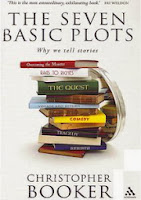by Ashley Lister
 I was going to be arsey about this week’s theme. I was going
to moan about my working with words – not numbers. I was going to pretend that
I have little to do with numbers because I’m a writer and writers work with
words.
I was going to be arsey about this week’s theme. I was going
to moan about my working with words – not numbers. I was going to pretend that
I have little to do with numbers because I’m a writer and writers work with
words.
To evidence this, I looked at the book titles that currently
sit on my reading list:
The Seven Basic Plots, Christopher Booker.
Twenty Master Plots, Ronald B Tobias
36 Dramatic Situations, Georges Polti,
The Five Minute Writer, Margaret Gerharty
Obviously, I told myself, these titles weren’t indicative of
all my books. Those titles were texts and more prone to the regimented values
of numeracy. Literature doesn’t have such a dependency on numerical values. I
went through a list of typical fiction titles from my personal bookshelves:
Five on a Treasure Island, Enid Blyton.
1001 Arabian Nights, Anonymous
’48, James Herbert
Three men in a Boat, Jerome K Jerome.
Fifty Shades of Grey, E L James
The Life of Pi, Yann Martel
The precedent for numbers in literature was possibly set by
Shakespeare with Edward III, Richard II, Henry
IV, (Part 1), Henry IV, (Part 2), Henry V, Henry VI, (Part 1), Henry VI, (Part
2), Henry VI, (Part 3), Richard III and Henry VIII.
Of course, the numbers in classic literature aren’t solely
down to Shakespeare. Joseph Heller wrote Catch
22, George Orwell wrote 1984, Bram Stoker wrote Count Dracula and
Dickens wrote A Tale of Two Cities.
 This is a trend that’s carried over to graphic novels and
comic books, 30 Days of Night, The
Fantastic Four and 21 (The Story of
Robert Clemente). It’s a trend that is endemic in films, not just with the
annoying sequels (Titanic II, High School
Musical 3, Friday the 13th Part 4) but in the body of the title
itself: 101 Dalmatians, Fifty first dates, 51st State, 28 Days
Later, 8 Mile etc…
This is a trend that’s carried over to graphic novels and
comic books, 30 Days of Night, The
Fantastic Four and 21 (The Story of
Robert Clemente). It’s a trend that is endemic in films, not just with the
annoying sequels (Titanic II, High School
Musical 3, Friday the 13th Part 4) but in the body of the title
itself: 101 Dalmatians, Fifty first dates, 51st State, 28 Days
Later, 8 Mile etc…
So, whilst I could have been arsey about numbers, and
claimed they have nothing to do with writing and words, I would have been wrong
and the chances are, I would have made myself look like a right one.
2 comments:
At last, you admit the importance of numbers.
Love this post.
This week has been fantastic.
Numbers rule.
And you're right. It has been a pretty good week.
Ash
Post a Comment